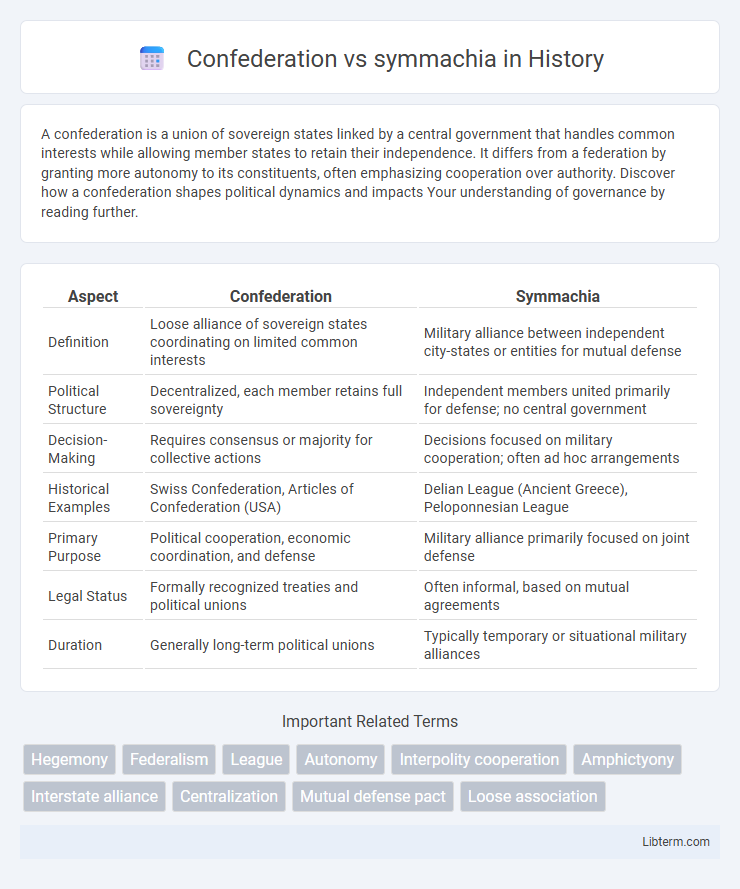A confederation is a union of sovereign states linked by a central government that handles common interests while allowing member states to retain their independence. It differs from a federation by granting more autonomy to its constituents, often emphasizing cooperation over authority. Discover how a confederation shapes political dynamics and impacts Your understanding of governance by reading further.
Table of Comparison
| Aspect | Confederation | Symmachia |
|---|---|---|
| Definition | Loose alliance of sovereign states coordinating on limited common interests | Military alliance between independent city-states or entities for mutual defense |
| Political Structure | Decentralized, each member retains full sovereignty | Independent members united primarily for defense; no central government |
| Decision-Making | Requires consensus or majority for collective actions | Decisions focused on military cooperation; often ad hoc arrangements |
| Historical Examples | Swiss Confederation, Articles of Confederation (USA) | Delian League (Ancient Greece), Peloponnesian League |
| Primary Purpose | Political cooperation, economic coordination, and defense | Military alliance primarily focused on joint defense |
| Legal Status | Formally recognized treaties and political unions | Often informal, based on mutual agreements |
| Duration | Generally long-term political unions | Typically temporary or situational military alliances |
Definition of Confederation
A confederation is a union of sovereign states or entities that retain their independence while delegating limited powers to a central authority for common purposes such as defense or trade. Unlike a symmachia, which is primarily an alliance for mutual military support, a confederation often involves broader political cooperation and shared governance mechanisms. The central authority in a confederation typically has weaker control compared to a federation, emphasizing the autonomy of member states.
Understanding Symmachia
Symmachia refers to a formal alliance between Greek city-states characterized by mutual military support and shared strategic objectives, distinct from a loose confederation with limited obligations. This military pact often required members to act collectively in defense and offense, enhancing cohesion and joint military effectiveness. Understanding symmachia highlights its role in fostering strong alliances based on reciprocal commitments, which contrasted with the more autonomous and less integrated nature of confederations.
Historical Origins of Confederation
The historical origins of confederation trace back to ancient Greece, where independent city-states formed loose alliances to coordinate defense and political objectives while maintaining sovereignty. These early confederations, such as the Delian League, allowed member states to retain autonomy but collaborate on common interests, distinguishing them from more integrated political unions. Unlike symmachia, which exclusively denoted military alliances, confederations evolved to encompass broader political and economic cooperation among member entities.
Ancient Roots of Symmachia
Symmachia, rooted in ancient Greek political organization, refers to a military alliance or coalition formed between city-states for mutual defense while preserving individual sovereignty. Unlike a confederation, which often implies a more formalized and sometimes centralized union of states with common institutions, symmachia emphasized cooperative defense without surrendering significant autonomous powers. This concept shaped early frameworks of collective security in the Greek world, influencing later alliances and confederations.
Structural Differences Between Confederation and Symmachia
Confederations consist of sovereign states that delegate limited powers to a central authority while retaining full independence, creating a loose union primarily for common defense or coordination. Symmachia refers to a formal alliance or league where member states collaborate closely based on mutual agreements, often including joint military operations but maintaining political autonomy. The structural difference lies in confederations having a more institutionalized central body with shared governance features, whereas symmachia emphasizes cooperative but independent entities united by treaty obligations.
Member Autonomy in Both Alliances
Confederations grant extensive member autonomy by allowing individual states to retain sovereignty and make decisions independently while collaborating on common interests. Symmachia alliances, typically formed through mutual defense pacts, involve cooperative efforts without fully ceding control, balancing member autonomy with collective strategic goals. Both frameworks emphasize member autonomy but differ in the scope of shared authority and integration levels.
Decision-Making Mechanisms Compared
Confederations typically operate through consensus-driven decision-making mechanisms where member states retain significant autonomy and require unanimous or near-unanimous approval for major policies. Symmachia involves a more integrated approach, often establishing joint decision-making bodies with majority voting procedures that enable coordinated strategies among allied states. The key distinction lies in the balance of sovereignty and central authority, with confederations favoring decentralized governance and symmachia promoting collective action through institutionalized cooperation.
Notable Examples from History
The Confederation system was exemplified by the Articles of Confederation in the early United States, which established a loose alliance of sovereign states with limited central authority. In contrast, symmachia was prominent in ancient Greece, notably the Delian League, where city-states formed a military alliance for mutual defense while maintaining political independence. Both systems highlight different approaches to collective security and governance, with confederations often emphasizing legal frameworks and symmachia focusing on strategic military cooperation.
Advantages and Disadvantages of Each System
Confederations offer member states significant sovereignty and flexibility, allowing them to retain independent governance and cooperate on specific issues such as defense or trade, but this can lead to weak central authority and inefficient collective decision-making. Symmachia, a form of military alliance typically seen in ancient Greek city-states, promotes strong mutual defense and unified military action, providing enhanced security, though it may require members to cede some autonomy and face complications in balancing individual and collective interests. While confederations emphasize political independence with potential fragmentation risks, symmachia centers on strategic cooperation with challenges in maintaining equal member influence.
Modern Relevance and Applications
Confederations remain relevant in modern international relations as they allow sovereign states to coordinate defense, economic policies, and diplomatic efforts while preserving their autonomy, exemplified by the European Union's structure. Symmachia, often seen in military alliances like NATO, emphasizes mutual defense obligations and collective security, binding members to assist each other in case of external threats. Both frameworks influence contemporary geopolitics by balancing national sovereignty with cooperative security and policy alignment.
Confederation Infographic

 libterm.com
libterm.com